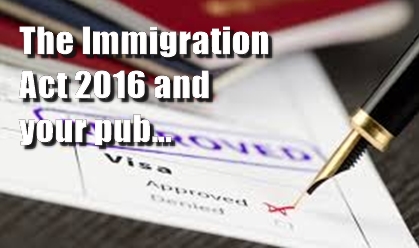The Immigration Act 2016 received Royal Assent on 12 May 2016 meaning it is now law and the measures contained in the Act have been implemented. The Act is intended to ‘strengthen the immigration system and make it harder than ever for people who have no right to be in the UK to live here’.
The Act contains a number of important changes which employers need to be aware of. The Act:
- Includes a new criminal offence which will make it easier to prosecute employers (and directors and officers within organisations) under the criminal law
- Increases the penalties for non-compliance with illegal working laws
- Introduces a new sanction of a 48 hour shut down for businesses which are suspected of employing illegal workers in specific circumstances
New criminal offence and tougher sanctions
Currently, criminal prosecutions against employers for illegal working offences are relatively rare (unlike civil action which is far more common). This is because the criminal offence involves an employer ‘knowingly’ employing someone who does not have the right to work in the UK and this degree of knowledge can be difficult to prove in practice. However, under the new Act, the scope of the criminal offence will be much wider so that employers who have ‘reasonable cause to believe’ that an individual is an illegal worker will be prosecuted.
The punishment for committing this new criminal offence will increase so that directors (and others) can face up to five years imprisonment. Currently the criminal offence of knowingly employing an illegal worker carries with it a sentence of up to two years imprisonment.
48 Hour business shut down
For those employers who have been issued with a civil penalty for illegal working in the last 3 years, there is a further risk that they should be aware of. Once the relevant provisions from the Act are in force, an Immigration Officer will have the power to shut down a business for up to 48 hours where further illegal working is suspected during an enforcement visit. The same powers will apply if the employer has failed to pay a previous civil penalty or if the employer has an unspent conviction for employing illegal workers.
This potential for operational and reputational damage is clear.
The closure may be cancelled if the employer demonstrates that it has conducted ‘right to work checks’. If evidence of non compliance is not produced, an application can be made to the courts to place the business under special compliance measures. As such, conducting and recording right to work checks is more important than ever under the new rules.
Licensing
For businesses that rely on alcohol and other licences, they may find that they are unable to renew their licence if they haven’t complied with Immigration laws in the past, including by employing illegal workers.
Enforcement action on the rise
In the financial year 2014/2016 nearly 2,000 civil penalties were issued throughout the UK. The government has shown that it is serious about taking action for those who do not comply with the law, and this action is only set to get more robust under the new rules. We expect to see a significant increase in criminal prosecutions in this area.
What does this mean for my pub?
- Employers who become aware of an illegal worker within their organisation will have to take action promptly in order to minimise the risk of criminal action being taken. Similarly employers who become aware of a visa expiring for one of its employees and who do nothing to deal with this may be exposed to criminal action being taken against them.
- Having stringent procedures in place to prevent illegal working is more important than ever. Given the potential for criminal action, directors and senior managers within a business are likely to want to ensure that their processes are audited regularly to ensure that there is no scope for breaches to arise.
To learn more about checking an employee has the right to work in the UK download this free Home Office Guide. The Home Office also has a free to use service to help you determine whether a person has the right to work in the UK, click here to use the service.
